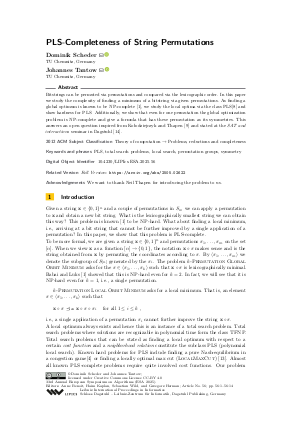PLS-Completeness of String Permutations
Authors
Dominik Scheder  ,
Johannes Tantow
,
Johannes Tantow 
-
Part of:
Volume:
33rd Annual European Symposium on Algorithms (ESA 2025)
Part of: Series: Leibniz International Proceedings in Informatics (LIPIcs)
Part of: Conference: European Symposium on Algorithms (ESA) - License:
 Creative Commons Attribution 4.0 International license
Creative Commons Attribution 4.0 International license
- Publication Date: 2025-10-01
File

PDF
LIPIcs.ESA.2025.56.pdf
- Filesize: 0.92 MB
- 14 pages
Document Identifiers
Related Versions
- Full Version https://arxiv.org/abs/2505.02622
Subject Classification
ACM Subject Classification
- Theory of computation → Problems, reductions and completeness
Keywords
- PLS
- total search problems
- local search
- permutation groups
- symmetry
Metrics
- Access Statistics
-
Total Accesses (updated on a weekly basis)
0PDF Downloads0Metadata Views
Abstract
Bitstrings can be permuted via permutations and compared via the lexicographic order. In this paper we study the complexity of finding a minimum of a bitstring via given permutations. As finding a global optimum is known to be NP-complete [László Babai and Eugene M. Luks, 1983], we study the local optima via the class PLS [David S. Johnson et al., 1988] and show hardness for PLS. Additionally, we show that even for one permutation the global optimization problem is NP-complete and give a formula that has these permutation as its symmetries. This answers an open question inspired from Kołodziejczyk and Thapen [Leszek Aleksander Kolodziejczyk and Neil Thapen, 2024] and stated at the SAT and interactions seminar in Dagstuhl.
Cite As Get BibTex
Dominik Scheder and Johannes Tantow. PLS-Completeness of String Permutations. In 33rd Annual European Symposium on Algorithms (ESA 2025). Leibniz International Proceedings in Informatics (LIPIcs), Volume 351, pp. 56:1-56:14, Schloss Dagstuhl – Leibniz-Zentrum für Informatik (2025)
https://doi.org/10.4230/LIPIcs.ESA.2025.56
BibTex
@InProceedings{scheder_et_al:LIPIcs.ESA.2025.56,
author = {Scheder, Dominik and Tantow, Johannes},
title = {{PLS-Completeness of String Permutations}},
booktitle = {33rd Annual European Symposium on Algorithms (ESA 2025)},
pages = {56:1--56:14},
series = {Leibniz International Proceedings in Informatics (LIPIcs)},
ISBN = {978-3-95977-395-9},
ISSN = {1868-8969},
year = {2025},
volume = {351},
editor = {Benoit, Anne and Kaplan, Haim and Wild, Sebastian and Herman, Grzegorz},
publisher = {Schloss Dagstuhl -- Leibniz-Zentrum f{\"u}r Informatik},
address = {Dagstuhl, Germany},
URL = {https://drops.dagstuhl.de/entities/document/10.4230/LIPIcs.ESA.2025.56},
URN = {urn:nbn:de:0030-drops-245245},
doi = {10.4230/LIPIcs.ESA.2025.56},
annote = {Keywords: PLS, total search problems, local search, permutation groups, symmetry}
}
Author Details
Acknowledgements
We want to thank Neil Thapen for introducing the problem to us.
References
- László Babai and Eugene M. Luks. Canonical labeling of graphs. In David S. Johnson, Ronald Fagin, Michael L. Fredman, David Harel, Richard M. Karp, Nancy A. Lynch, Christos H. Papadimitriou, Ronald L. Rivest, Walter L. Ruzzo, and Joel I. Seiferas, editors, Proceedings of the 15th Annual ACM Symposium on Theory of Computing, 25-27 April, 1983, Boston, Massachusetts, USA, pages 171-183. ACM, 1983. URL: https://doi.org/10.1145/800061.808746.
- Christoph Buchheim and Michael Jünger. Linear optimization over permutation groups. Discret. Optim., 2(4):308-319, 2005. URL: https://doi.org/10.1016/J.DISOPT.2005.08.005.
- Dominic Dumrauf and Burkhard Monien. On the PLS-complexity of maximum constraint assignment. Theor. Comput. Sci., 469:24-52, 2013. URL: https://doi.org/10.1016/J.TCS.2012.10.044.
- Alex Fabrikant, Christos H. Papadimitriou, and Kunal Talwar. The complexity of pure nash equilibria. In László Babai, editor, Proceedings of the 36th Annual ACM Symposium on Theory of Computing, Chicago, IL, USA, June 13-16, 2004, pages 604-612. ACM, 2004. URL: https://doi.org/10.1145/1007352.1007445.
- John Fearnley, Paul W. Goldberg, Alexandros Hollender, and Rahul Savani. The complexity of gradient descent: CLS = PPAD ∩ PLS. In Samir Khuller and Virginia Vassilevska Williams, editors, STOC '21: 53rd Annual ACM SIGACT Symposium on Theory of Computing, Virtual Event, Italy, June 21-25, 2021, pages 46-59. ACM, 2021. URL: https://doi.org/10.1145/3406325.3451052.
- Merrick L. Furst, John E. Hopcroft, and Eugene M. Luks. Polynomial-time algorithms for permutation groups. In 21st Annual Symposium on Foundations of Computer Science, Syracuse, New York, USA, 13-15 October 1980, pages 36-41. IEEE Computer Society, 1980. URL: https://doi.org/10.1109/SFCS.1980.34.
- Marijn Heule, Warren A. Hunt Jr., and Nathan Wetzler. Expressing symmetry breaking in DRAT proofs. In Amy P. Felty and Aart Middeldorp, editors, Automated Deduction - CADE-25 - 25th International Conference on Automated Deduction, Berlin, Germany, August 1-7, 2015, Proceedings, volume 9195 of Lecture Notes in Computer Science, pages 591-606. Springer, 2015. URL: https://doi.org/10.1007/978-3-319-21401-6_40.
- David S. Johnson, Christos H. Papadimitriou, and Mihalis Yannakakis. How easy is local search? J. Comput. Syst. Sci., 37(1):79-100, 1988. URL: https://doi.org/10.1016/0022-0000(88)90046-3.
- Leszek Aleksander Kolodziejczyk and Neil Thapen. The strength of the dominance rule. In Supratik Chakraborty and Jie-Hong Roland Jiang, editors, 27th International Conference on Theory and Applications of Satisfiability Testing, SAT 2024, August 21-24, 2024, Pune, India, volume 305 of LIPIcs, pages 20:1-20:22. Schloss Dagstuhl - Leibniz-Zentrum für Informatik, 2024. URL: https://doi.org/10.4230/LIPICS.SAT.2024.20.
- Mark W. Krentel. On finding locally optimal solutions. In Proceedings: Fourth Annual Structure in Complexity Theory Conference, University of Oregon, Eugene, Oregon, USA, June 19-22, 1989, pages 132-137. IEEE Computer Society, 1989. URL: https://doi.org/10.1109/SCT.1989.41819.
- Christos H. Papadimitriou. On graph-theoretic lemmata and complexity classes (extended abstract). In 31st Annual Symposium on Foundations of Computer Science, St. Louis, Missouri, USA, October 22-24, 1990, Volume II, pages 794-801. IEEE Computer Society, 1990. URL: https://doi.org/10.1109/FSCS.1990.89602.
- Christos H. Papadimitriou, Alejandro A. Schäffer, and Mihalis Yannakakis. On the complexity of local search (extended abstract). In Harriet Ortiz, editor, Proceedings of the 22nd Annual ACM Symposium on Theory of Computing, May 13-17, 1990, Baltimore, Maryland, USA, pages 438-445. ACM, 1990. URL: https://doi.org/10.1145/100216.100274.
- Alejandro A. Schäffer and Mihalis Yannakakis. Simple local search problems that are hard to solve. SIAM J. Comput., 20(1):56-87, 1991. URL: https://doi.org/10.1137/0220004.
-
Neil Thapen. personal communication.

- Nathan Wetzler, Marijn Heule, and Warren A. Hunt Jr. Drat-trim: Efficient checking and trimming using expressive clausal proofs. In Carsten Sinz and Uwe Egly, editors, Theory and Applications of Satisfiability Testing - SAT 2014 - 17th International Conference, Held as Part of the Vienna Summer of Logic, VSL 2014, Vienna, Austria, July 14-17, 2014. Proceedings, volume 8561 of Lecture Notes in Computer Science, pages 422-429. Springer, 2014. URL: https://doi.org/10.1007/978-3-319-09284-3_31.
